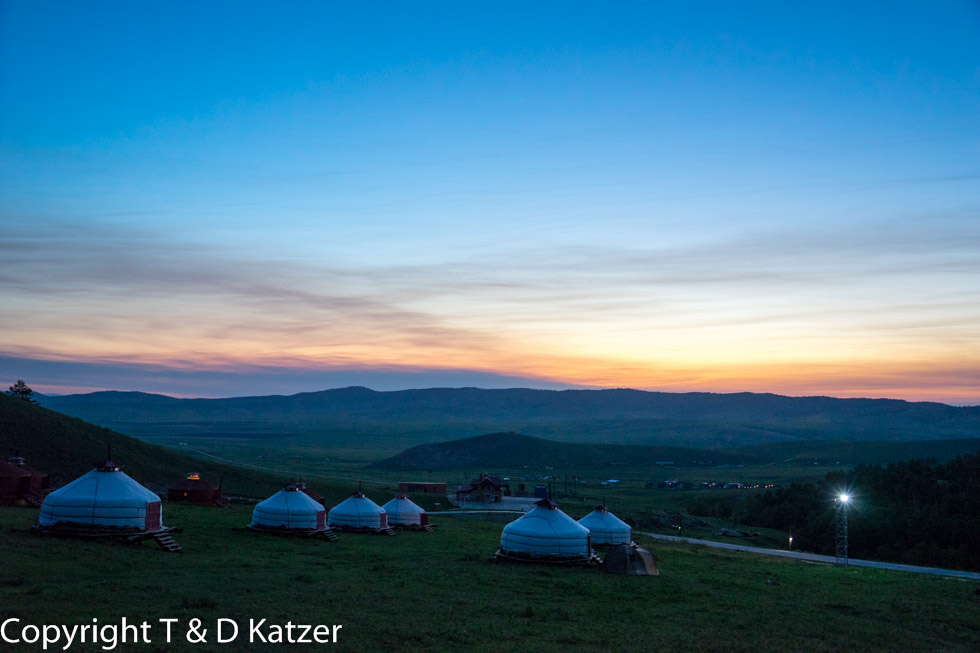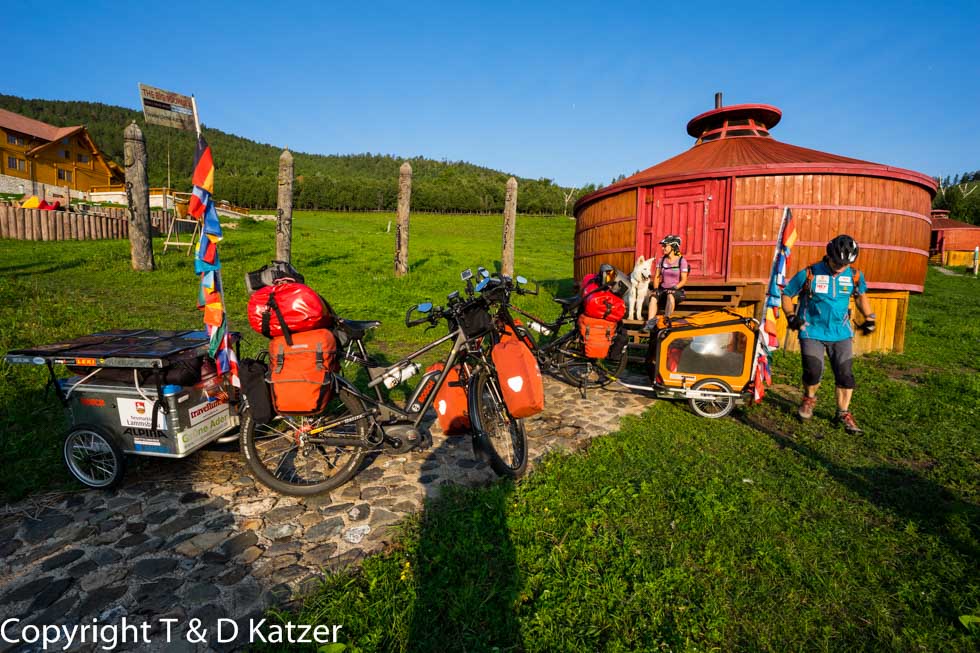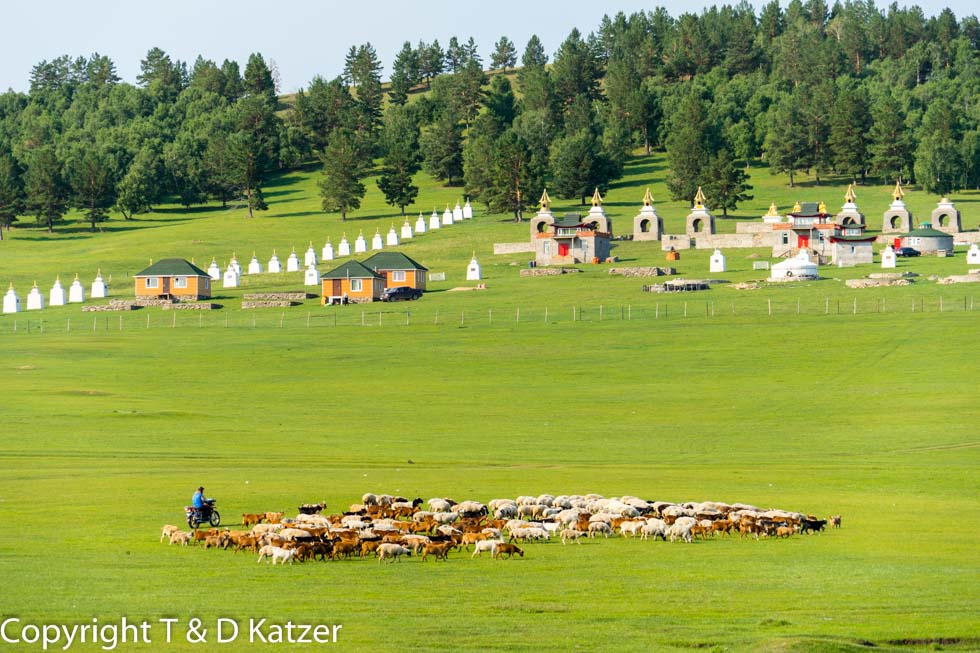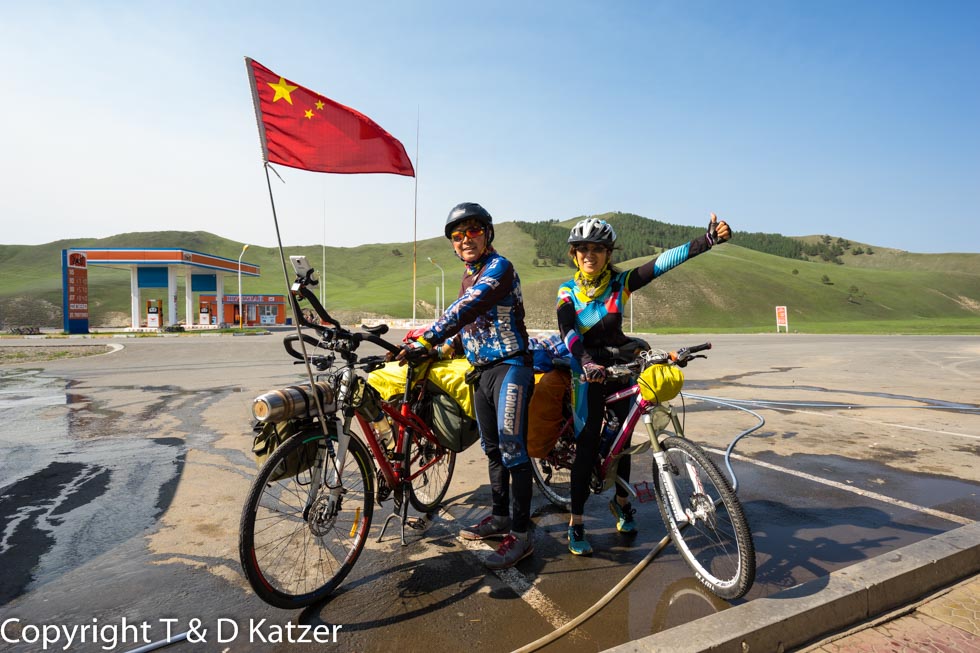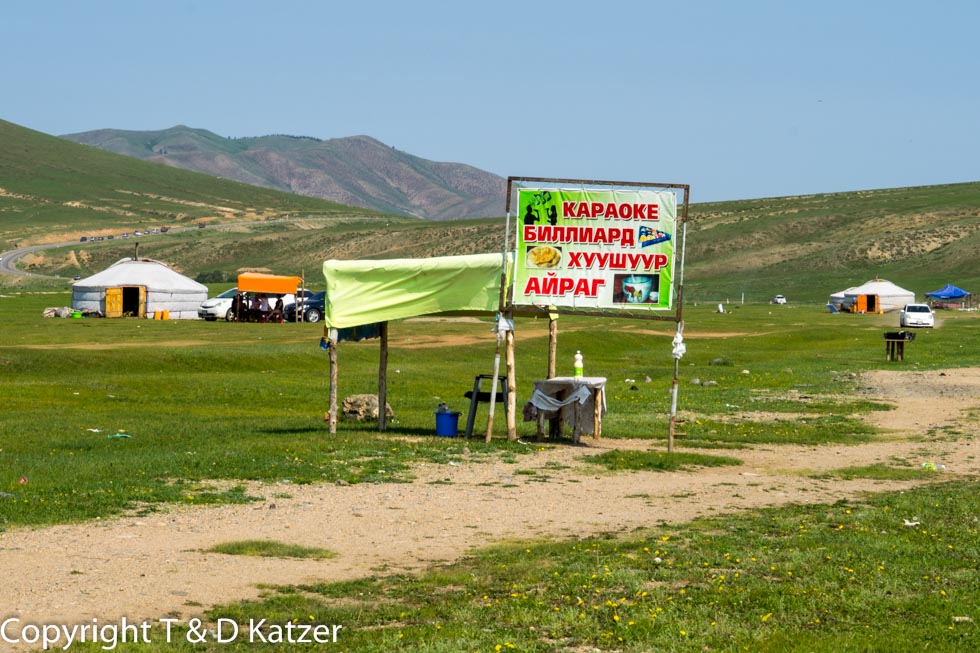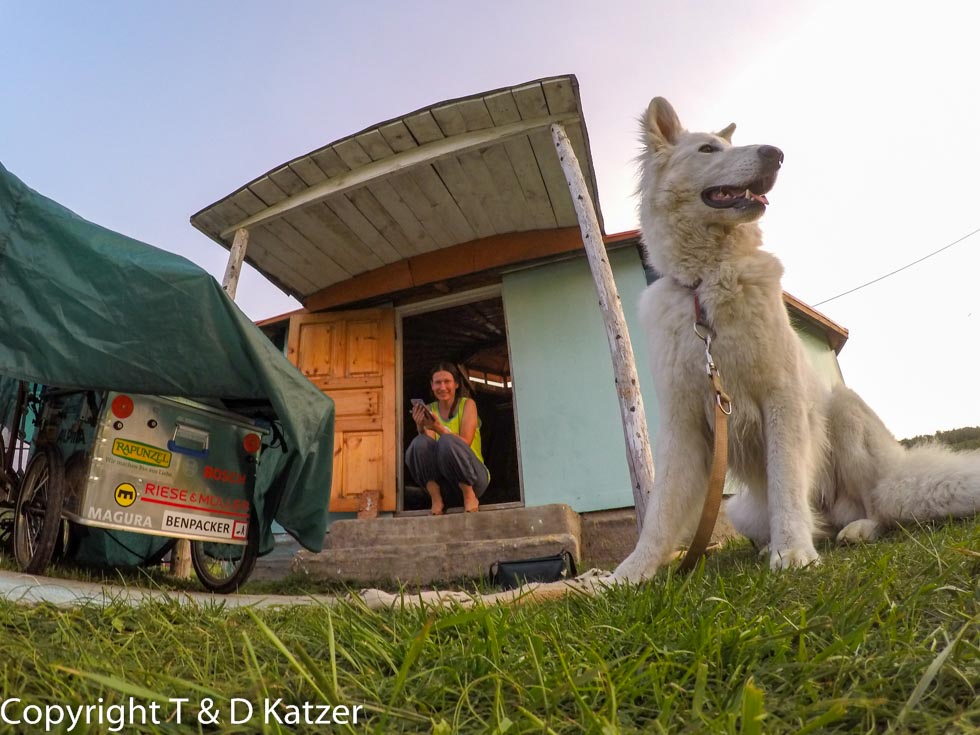
Every decision has consequences
N 48°10'58.0'' E 106°22'17.1''
Date:
09.8.2015
Day: 42
Country:
Mongolia
Location:
Yurt camp 2
Latitude N:
48°10’58.0”
Longitude E:
106°22’17.1”
Kilometers per day:
59
Total kilometers:
8.502
As the crow flies:
44
Aver. Sib.
17.8 km/h
Maximum speed
44 km/h
Travel time hrs
3:18
Ground conditions:
Asphalt
Maximum height:
1500 meters
Sunrise:
06:36 a.m.
Sunset:
9:27 pm
Temperature day max:
35 degrees
Departure:
8:30 a.m.
Arrival time:
3:00 p.m.
(Photos of the diary entry can be found at the end of the text).
Even the best days come to an end, which is why we have to leave this paradisiacal place. It is still dark when we start packing. To prevent Ajaci’s trailer from tipping over again, we load the large Ortlieb bag from the roof rack into the trailer. Because we don’t see any herds of cattle or sheep, Ajaci is allowed to run alongside the bikes. He enjoys his freedom until he picks up a scent and is about to chase something. “I’d better put it back on the hip belt,” I say. Then we continue our journey along the bumpy, stony path. Back on Highway 3, we continue upwards. To save energy and give Ajaci some exercise, he is allowed to run a few more kilometers next to me. When he starts to pull away, we pack him back into his caravan. Just a short time later, we come across a brand new, large fast food restaurant. Many cars are parked in front of it, Mongolian music blares from the loudspeakers, ice cream is sold and sandwiches are on offer. If we didn’t know we were in Mongolia, this place could also be in America or somewhere in Western Europe. “I’m hungry,” I say as the tempting smell of food wafts over to us. Although it is still far too early for a rest, we stop, put the bikes on the stands and get a tasty Mongolian meal. “Are those cyclists up ahead?” asks Tanja. “It almost looks like it,” I say, watching the man holding his head under a water hose to cool off. “They’re definitely cyclists. Drivers don’t put their heads under a water hose,” I say confidently and get up to greet my colleagues. “Where do they come from?” I ask. “From China. We cycled from Beijing through Mongolia to Siberia and are currently on our way back,” explains the 50-year-old with pride in her voice. “Wow, that’s fantastic. They’re the first Chinese people I’ve met on bikes outside their own country. Can I take a picture of them?” “Of course,” the couple reply in sync and pose in front of their bikes. When I return to my meal, a Mongolian woman speaks to us in German. “And they drove all the way from Germany to our country?” she asks with a Franconian accent. “Where did they come from?” I ask in amazement. “From Erlangen,” the lady replies. “I’ve been living there with my German husband for a long time. We are currently on vacation to visit my family,” she explains while her young son asks for an ice cream in perfect Franconian and the Mongolian grandma shakes her head incessantly about our trip. “Are you human or made of iron?” she asks me, not understanding that we are voluntarily riding our bikes over the many mountains in these temperatures.
We reach the dusty village of Ihsuuj late in the afternoon. The mayor of the region pulls up next to us in his car. The usual questions are asked. Then he invites us to join his family for a Mongolian meal outside the city. We explain to his daughter, who translates everything for her father, that we are too tired to turn back. “We’ll look for accommodation here in the village,” we say, say thank you and pedal our bikes through the desolate town. We quickly find the cottage where we have already spent the night. The tiny store on the ground floor is now four times as big. When I enter to ask for a room, I immediately recognize our hostess from back then. As we were her first foreign overnight guests at the time, I think I can read in her eyes that she remembers me. She calls her daughter, who is now about 13 years old. “Yes, we have a room available. It costs 30,000 tugrik,” (€13.43) she says in relatively good English. I follow her to the second floor where I am almost knocked out by the heat. “Here,” she says in a somewhat arrogant tone, pointing to a room where not even pigs would feel comfortable. “Wow, it looks really bad there,” I say, running my eyes over the garbage bins in shock. “If you don’t want the room, you can move into the other room,” she replies, raising her head and looking me up and down. Since I still remember the girl when she was about seven years old, I wonder about her development. Back then it was a lovely, helpful, small and extremely pretty thing. How ugly arrogance can make you, I think to myself and ask the price of the room, which is hardly any different from the others. “40,000 Tugrik”, (€17.91) she suddenly increased the price by 10,000 Tugrik (€4.48). “40,000 tugrik? That’s the price of a luxury room in a city,” I reply, shaking my head. “You can also move into a yurt. It costs 50,000 tugrik (€22.38), she says dismissively and shows me the Mongolian dwelling that is set up in the dusty, run-down and unkempt courtyard. Because of the sun, it is even hotter in the yurt than in the holes under the roof. Without saying a word, I leave the once well-kept accommodation where we were treated with hospitality.
“So spending the night in there is an imposition. Apart from that, people have become arrogant and unfriendly,” I say to Tanja. “How much power do we have left?” she asks. “Two batteries are already empty. With the Goal zero charge and the full battery three, we can still manage around 40, maybe 50 kilometers. The gradients have increased, so the range is difficult to estimate.” “So we won’t make it to Ulan Bator?” “No, it doesn’t make sense today. It’s best to drive into the city in the morning when we’re still strong and have all our attention to cope with the traffic of a big city.” “Okay, then we’ll drive as far as we can today. But where do we charge our batteries for tomorrow’s route?” Tanja wants to know. “About the solar panels. I’ll just have to put them somewhere in the sun for a few hours tomorrow,” I think. Although we are aware that our current energy supply could leave us stranded, we leave the dusty nest. It continues steeply uphill. The altimeter on my watch shows 1,500 m. The energy display drops rapidly. After a pass, we glide into a long valley and make up some distance. More and more small, primitively built stalls huddle by the roadside where the nomads sell their airag (mare’s milk). With sometimes bizarre posters, they try to draw the attention of passing motorists to themselves and their plastic-bottled product. Some of the banners advertise karaoke. This has nothing whatsoever to do with horse milk, but at least there is a chance that drivers will notice them.
“Look over there on the mountainside. It looks like someone is renting out yurts there!” I shout to Tanja. We stop at the roadside and ask a couple of Mongolians if it’s possible to spend the night up there. “Be medehgüj”, (I don’t know) they reply. “I think we should go up there,” I suggest. “But that costs an enormous amount of electricity,” replies Tanja. “Maybe one of us should run up and ask,” she says. “Running uphill also costs us energy and to be honest, I’m completely exhausted today. We’ll just risk it and invest the power for the climb,” I decide, whereupon we shift the Rohloff into third gear and push our e-bikes up the mountain with the heavy load. To save energy, Ajaci is allowed to use the hip belt so Tanja doesn’t have to pull him. Then we continue over difficult terrain up the dirt track to an altitude of approx. 1,600 m. A few people are sitting on the steps of a log cabin. “Are the yurts over there for rent?” I ask in broken Mongolian. “Tijmee”, (Yes) I hear with relief. “Nadad Ger heregtei”, (We need a yurt) “Tijmee”, I hear, reassured that I don’t have to drive any further. A young girl runs to fetch the owner of the yurt complex. As always, we answer the questions about where from and where to. After about 20 minutes, two women arrive and greet us in perfect English. They lead us to a spacious yurt built in the middle of the green grass on a breathtakingly beautiful mountainside. “Costs 70,000 tugrik.” (€31.34) “Is there a cheaper one?” “Yes, for 50,000 tugrik. (€22.39) But you’ve come from so far away and are certainly tired. If you want, you can stay in the luxury yurt. We’ll give it to them for 50,000 tugrik,” offer the two sisters, who lived in New York for many years and are building up a business here.
Once we have carried everything into the yurt, we sit down on the steps in front of the entrance and enjoy the peace and quiet and the pleasantly cool evening breeze. From our elevated spot we can see the highway on which an endless stream of cars winds its way towards Ulan Bator. Traffic has increased enormously and is increasing every year, we were told. At the moment, highway number 3 is as busy as a German main road used to divert a closed highway. “That’s the Sunday evening traffic. People are all coming back from their weekend getaway and heading back to the capital,” the yurt owner explained to us.
“Once again it’s shown how sensible it was to listen to your instincts,” I say, looking at the headless line of lights. “Yes, they just wanted to rip us off in the last village. They realized that we were tired and wanted to put us in their dirty room for a completely inflated price,” Tanja replies. “And we drove on even though we were aware that we might break down in the middle of the road,” I add. “It shows once again that it makes no sense to be guided by fear,” Tanja muses. “Certainly. Fear makes us unfree and limits our lives. If we had given in to fear, we would be sitting in a dirty, hot hole right now. What’s more, we would have had to park our bikes in the rotten courtyard. Who knows if they would have been stolen there?” I ponder. “Who knows? It’s interesting what consequences every decision, no matter how small, can have,” Tanja concludes with a satisfied smile.
The live coverage is supported by the companiesGesat GmbH: www.gesat.com and roda computer GmbH www.roda-computer.com The satellite telephone Explorer 300 from Gesat and the rugged notebook Pegasus RP9 from Roda are the pillars of the transmission.
